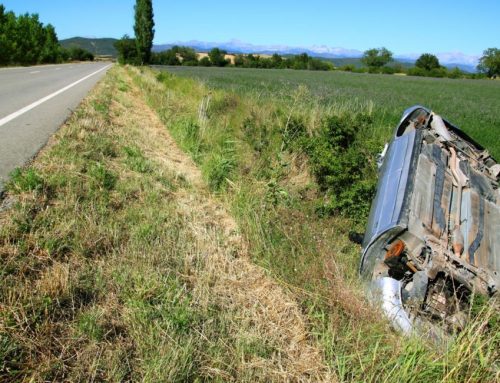John Maher: Hi. I’m John Maher. Today I’m speaking with Russell Guest and Richard Allen of Guest and Brady in Greenville, South Carolina. Guest and Brady is a personal injury law firm.
Today we’re going to be talking about auto accidents and lost wages. Russell and Richard, welcome.
Russell Guest: Thank you, John. Happy to be here.
Richard Allen: Thanks, John, for having us.
John: Sure. What are lost wages?
Russell: Richard, you want to answer that?
Richard: Sure. Lost wages can take the form of many things. In the realm of an automobile accident, if you’ve been involved in an accident and sustain injuries that have either impacted your ability to work, have put you out of work, so that you’re not able to earn income and wages. Then that could be an element of your damages that you would to ask to be compensated for in a claim against an at‑fault driver.
John: So, if I’m injured in an auto accident, will I be paid for lost wages, and who pays that? Is that the insurance company?
Russell: Yes. Typically, the insurance company – now let’s understand it for a moment. We’re talking about a situation where a person is in an accident where there’s another person who’s the at‑fault person who caused the accident.
The way it works is that particular person who was negligent is the person who owes you the responsibility to pay for your damages, including lost wages.
What they have done is they have insured themselves against such an accident they might cause by paying a premium to an insurance company. So oftentimes we’ll talk about filing a claim with an insurance company, but really you’re filing a claim against the individual who’s responsible for that. Then the insurance company is picking it up and helping to pay for those damages that the insured has caused.
Now, from a liability of the at‑fault party’s insurance company, they will not pay for damages along the way. If you’re losing income on a weekly basis, not able to work, a lot of people mistakenly believe that that other insurance company will pay as you’re experiencing these lost wages.
That’s just not the way it works in South Carolina. That insurance company wants to wait until all of the elements of your damages or your claim are known to them or you present that to them and you’re willing to settle before they actually make an offer to you for any of those damages, including the lost wages.
Now that’s not really fair, but that’s the way the insurance company sometimes will use that as a leverage against you because they know that you’re suffering and you need to go ahead and resolve this claim in order to get some money in to put food on the table for the family or to pay the bills that are adding up.
There are other types of coverages, however, that you might be able to rely on to help you while the at‑fault driver’s insurance company is not paying. Some of those types of insurance coverages might be – there is a personal injury protection coverage that is not a mandatory coverage, but is an optional coverage that many insurance companies have, that includes not only medical payments, but also includes a lost wage component. These can often be very useful in times like this.
It’s a premium that you’re paying. It’s an optional premium, so you get to enjoy that insurance company paying you that lost wage back but also, later on, presenting the same lost wages to the at‑fault insurance company and having them to pay that to you.
The at‑fault company doesn’t get the benefit of saying, “Well, no. You’ve already been getting paid for that because you chose to pay an extra premium for that coverage.”, and so the at‑fault insurance company still has to pay that loss that you experienced. Your own coverage will not ask for it to be reimbursed to them. That’s a good coverage to have. We’d recommend that. It’s not very expensive either.
Certainly, I’ve had clients use that to their benefit. One particular lady I recall had a serious T‑bone accident where a car came through an intersection and ran a red light, just creamed her, and fractured her hip in multiple places. She was an assembly person on a manufacturing line. She was not able to get back to that job.
She had been paying for this PIP coverage with the lost wage component to it for probably 10 years, wondering whether she would ever use it. Here it was. She was able to use it and it really saved her. It was $20,000 in wages that she was able to recover from that.
It helped her to overcome the period of time that she was recovering from her injuries and allowed her not to be able to settle, or be forced to settle, very quickly with the at‑fault coverage. The at‑fault insurance company said that she was able to make a much better settlement with that at‑fault carrier because of that coverage that she was protecting herself with.
Also, there’s short‑term disability that often is offered by a company or you might purchase it as an individual. That comes paid for, either directly by an employer that you may be working for or also might be paid out of a salary or paycheck deduction. Either way, you can use that.
Oftentimes, though, those are difficult sometimes because they require you to reimburse them for every dollar that they’ve paid out of it, dependent upon the types of policy that it is, whether it’s an individual policy. It really just depends on the circumstances, but they will help bridge the gap. So I understand completely when people use them. You have to be careful about what it will mean to you later on when you do.
Sometimes, people are injured in an automobile accident while they’re working. They have two claims. They have a worker’s comp claim that will pay for them while they’re out of work, pay for lost wages that they’re experiencing, and then also they have their automobile accident claim. That’s a third‑party claim, we call it.
Those are two separate claims. They can both be worked. In those instances, where you have that, you really do need to have an attorney helping you with those types of claims. In South Carolina, the worker’s comp carrier would have a right to be reimbursed what they paid out once you resolve the automobile accident claim.
And there’s also an order in which we would want to do that. You don’t want to resolve one without having discussions and notifying the worker’s comp carrier about your intentions to do so. If you did, without notifying them, then you could lose some options for payment. They could deny payment of your claim because you have elected your remedy without talking to the worker’s comp carrier about your settlement.
So you’ve got to be careful with these things and the different ways of settling these types of cases. But these are protections that you can have in terms of lost wages.
John: It sounds like it’s worth talking to an auto accident attorney because there are an awful lot of complexities to the situation that you might need help with. What is the difference between lost income and lost compensation?
Russell: So, there are different types of ways that we get paid. We have benefits that we receive from our employer that we might be enjoying. It might be that the employer’s paying for a substantial part of, or all of the health insurance premium, or might be paying for all of the long‑term or short‑term disability premiums, also might be offering you vacation time or PTO time.
There are different forms of compensation, other than being paid an hourly wage or a salary. If you’re receiving a salary, and the employer continues to pay you, oftentimes, they’ll want you to use your PTO time or your vacation time.
And in so doing, they’re still paying you your wage, at the same level, but you’re having to use these things that you are trying to save for your own personal time off, like taking a child to the doctor or going on a vacation with your family.
These things, you should not have to suffer the loss of just because you’ve been in an accident, and you should be fully compensated for that. Some people will say to me, “Well, I did get paid for it. The company just continued to pay for it.”
Yeah, but you wouldn’t have taken that time, and now you don’t have it, so you should be compensated for it. And once they begin to understand that, then they’ll understand that they need to be compensated for that time.
Also, the premiums, if they’re out on – for healthcare coverage – if they’re out on short‑term disability, oftentimes – or long‑term disability – that premium is deducted from that check so that you are able to continue your health insurance, or your portion of it at least.
Your employer is not contributing that amount. You, because you’re out of work, have no other means of paying for it. You’re getting a reduced amount from your disability check and that’s not fair for the at‑fault insurance company not to have to compensate you for that lost compensation.
John: What information do I need in order to file a wage loss claim with my insurance company? Do I need to provide some proof of lost wages from my doctor or my employer?
Richard: First of all, it’s critical. It sort of ties into the treatment component of the claim. You certainly need to be treating with the doctor. You need to have a doctor saying that your symptoms or injuries are related to the accident and preventing you from working. If you’re a salaried or W‑2 employee then, obviously, you need to collect pay stubs, a W-2 form.
Not to jump ahead to the next topic, but it becomes a bit more challenging if you’re self‑employed or perhaps a contractor. Russell, is there anything you’d like to add?
Russell: I just want to stress the point that you already pointed out about that disability note or out of work statement. That is critical for the evaluation of an insurance company. If you don’t have an out of work statement from the doctor or disability note, our experience is that insurance companies will completely discount your lost wages.
You’ll say, “Gosh, I had a broken leg. I couldn’t work.” They will come back and say, “We don’t know that they weren’t paying you along the way, that you weren’t still receiving your income. We don’t know that the doctor didn’t say that you could do some light duty, and that you just refused to go in there and do your light duty.”
The insurance company, I promise you, will take a cynical approach and try to deny you from whatever compensation that they can. Remember, they make money by denying the types of coverages or damages that you might be able to fairly claim.
Having that disability note from the doctor will help protect you, and protect the claim, so make sure that you grab that or make sure that the doctor is making that a part of their medical note. The other part that Richard mentioned is also critical – making sure that the doctor is relating it to the accident. I can’t tell you how many times we might have somebody going into the office of a doctor, and then complaining about a particular injury that they have.
They’ve said something about their accident, and how it occurred because they are out of the accident yet. The doctor’s notes reveal nothing about that. They’re just silent to that because sometimes, the doctor really doesn’t care.
What they want to know is what kind of injury you have, and how do they treat that injury to make you better? They’re providing healthcare. But from a claim standpoint, you need to specifically ask that the doctor include in the medical records that the injury is related to an auto accident that happened on whatever day that was.
And that can be an important aspect of any type of claim that you’re making, but including the lost wage claim and disability note.
John: Richard mentioned if you’re self‑employed, that that can add some complexity to making a wage loss claim. Can you still file a claim if you’re self‑employed?
Richard: Yes, certainly. You got to be able to document a lost income, having the doctor relate it, and continue to treat. And if you’re continuing to have symptoms, articulate those. We’ve had clients who are not salaried or W‑2 employees and – for instance, they may be building contractors – and I think an important point there is you need to have documents. It’s important to keep records, and written records.
Oftentimes, an insurance company is going to do all they can to poke holes in a particular claim, and so if you’ve got documentation or evidence that can corroborate the damages that you’re claiming, for instance if you lost a particular job because of an accident that’s put you out of work, then you would certainly want to be able to document that and that loss.
Another thing that comes into play are tax returns, which can oftentimes frighten clients. But that is something that can also be used. If litigation is required, that’s something that would have to be produced or discovered, so that would be something that you might need to be prepared to present, again if you’re trying to substantiate your claim and don’t necessarily have the pay stub or W‑2.
John: What if I don’t make a full recovery, and I can’t return to my work? I know, Russell, you mentioned that before, that there is the possibility that you’re injured, and whatever the injury is that you have, it’s just not getting better or maybe won’t get completely better, you won’t fully heal. And you simply are not able to perform your duties of your current job. What is the situation there, and what can be done about that?
Russell: Well, obviously, this is a very difficult circumstance. We want to be careful in how we deal with that. In this instance, a lot of factors come into play – whether we have pre‑existing conditions, the insurance companies will often try to use those against us; whether the injury or the pre‑existing injury is the principal cause of our inability to continue work, or how much the accident caused the inability to continue work, and the insurance company will want to point to that pre‑existing injury.
Of course, what often happens in those circumstances is that we’re working. And we’re dealing with whatever pre‑existing injury or condition that we might have, maybe low back pain which is not very difficult to deal with, but we just manage our way through it, or we’ve got some other condition that we continue to deal with.
Then, we got an accident that comes in that aggravates or accelerates the condition that makes it so much worse that now we’re not able to continue. The law clearly allows for us to recognize that that’s possible and to recover on that aggravation or acceleration of that condition. But we have to be able to prove it. It can be more challenging for sure, but we need to be getting medical treatment. Hopefully we’ve had medical treatment for the condition that existed prior. And then, we have some evidence of the condition before the accident and after the accident. And we can talk to the medical providers, and we can use them to help our expert witnesses to understand the differences, and how this accident did aggravate it and made the condition worse.
Oftentimes, there are diagnostic tests that will help us show that – be it a very objective test, whether there’s an MRI that shows a structural change in a spinal condition or to a hip condition or a neck condition. Or it could be a nerve conduction study. It could be different types of tests that would help us with that.
We have the evidence of the clinical studies before and after the accident. We have the diagnostic tests. These things are helping us to prove that you have a condition that was caused by the actual accident that prevents you from working. Because anything the insurance company can do to point to something else other than the accident, they will do.
This is part of the issue that we need to understand. Also, understanding the amount of lost wages that you have going into the future. Now, in complex cases where you’ve got a serious injury ‑‑ maybe paralysis or a brain injury ‑‑ we might have to do some extensive testing on a brain injury client to understand why they can’t actually perform their former work and hire the experts to be able to testify to that.
But also we’ve got to sometimes hire an economist to help us show, if there’s a person who’s been self‑employed, to be able to look through the records that Richard was talking about earlier and to understand the business ‑‑ what kind of income that person was able to get off of that business, separate that from the business expenses, and project out into the future the type of income that that particular person has lost and will lose, and make that a part of the evidence that we present to the insurance company in making a full recovery for the damages that we have lost.
Now, full recovery is not just lost wages. In that instance, we might need medical care going forward, so there’s the future medical care aspect. Then there could be home care that we might need. There might be home modifications that we need.
There are a lot of elements that go into if you can’t return to work and you’re now in a different stage of your life because of this accident. We really need to understand that and address all the issues of how your life has been modified or changed by this accident.
John: That’s really great information. Russell Guest and Richard Allen, thanks very much for speaking with me today.
Richard: Thank you.
Russell: Thank you for having us.
John: For more information about Guest and Brady, visit their website at guestbrady.com or call 800‑903‑8101. That’s 800‑903‑8101.







